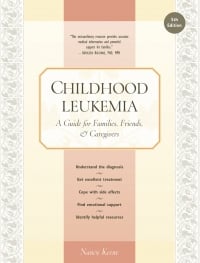Childhood Leukemia
Preventing Mistakes
Everyone makes mistakes and hospital workers are no exception. You can help by checking before any medications or blood transfusions are given. For instance, check that the name of the drug and the dose match what the protocol says should be given; if you were not given a summary of the protocol (sometimes called the roadmap), you can ask your nurse or doctor for a copy. You should feel free to ask questions or point out any deviations from prescribed treatment. Parents are the last line of defense against mistakes.
In the beginning I didn’t feel comfortable voicing my opinion, but I got over that, thank goodness. I used to be a people pleaser and worried about stepping on people’s toes. But now, I recommend trusting your instincts and never doubting that you know your child best. For instance, when a nurse was putting a new dressing on my daughter’s line, I saw a hole in the dressing right over the site. It felt like an out of body experience. I pointed out the hole and the nurse said, “Oh, my goodness!” and she fixed it. I’ve learned not to second guess myself about things that bother me. I’ve always been naive thinking that doctors and nurses always know what they are doing. But, now I realize it’s been empowering for me as a mom that I know when things are wrong. Although I wish I was learning that lesson in a different way.
Whenever a family member isn’t present, children who are old enough should have a charged cell phone or be taught to use the phone in the room. Tape a phone number nearby where a parent can be reached and tell your child to call if anyone tries to do procedures that are unexpected. The hospital staff should be informed that any changes in treatment (except emergencies) need to be authorized by a parent.
Brian was 12 and could have stayed alone, but we never left him for more than five minutes to run down the hall for coffee, bathroom, etc. Someone—my husband, me, a grandparent, an aunt or uncle—was always there. If we had needed them, church members and friends had also volunteered, as Kevin (the younger brother) was only 2 at the time. With my husband rotating days at work and the hospital, and me rotating home and hospital, somehow we managed. A caring employer is essential.
Also, Brian became very familiar with all his drugs, allergies, reactions, and doses. Several times he corrected the staff even before I could. We also had errors and near-errors, as I’m sure everyone does, but many fewer, I’m sure, because of the constant presence and watchful eyes. Operating room doctors and nurses accessed his line without first swabbing with alcohol. Someone wanted to give ibuprofen for fever. Non-oncology nurses were working the pediatric oncology floor and knew less than we did. Our hospital is now greatly improved, but things like this happen everywhere.
Table of Contents
All Guides- Introduction
- 1. Diagnosis
- 2. Overview of Childhood Leukemia
- 3. Acute Lymphoblastic Leukemia
- 4. Acute Myeloid Leukemia
- 5. Juvenile Myelomonocytic Leukemia
- 6. Chronic Myelogenous Leukemia
- 7. Telling Your Child and Others
- 8. Choosing a Treatment
- 9. Coping with Procedures
- 10. Forming a Partnership with the Medical Team
- 11. Hospitalization
- 12. Central Venous Catheters
- 13. Chemotherapy and Other Medications
- 14. Common Side Effects of Treatment
- 15. Radiation Therapy
- 16. Stem Cell Transplantation
- 17. Siblings
- 18. Family and Friends
- 19. Communication and Behavior
- 20. School
- 21. Sources of Support
- 22. Nutrition
- 23. Insurance, Record-keeping, and Financial Assistance
- 24. End of Treatment and Beyond
- 25. Relapse
- 26. Death and Bereavement
- Appendix A. Blood Tests and What They Mean
- Appendix B. Resource Organizations
- Appendix C. Books, Websites, and Support Groups

